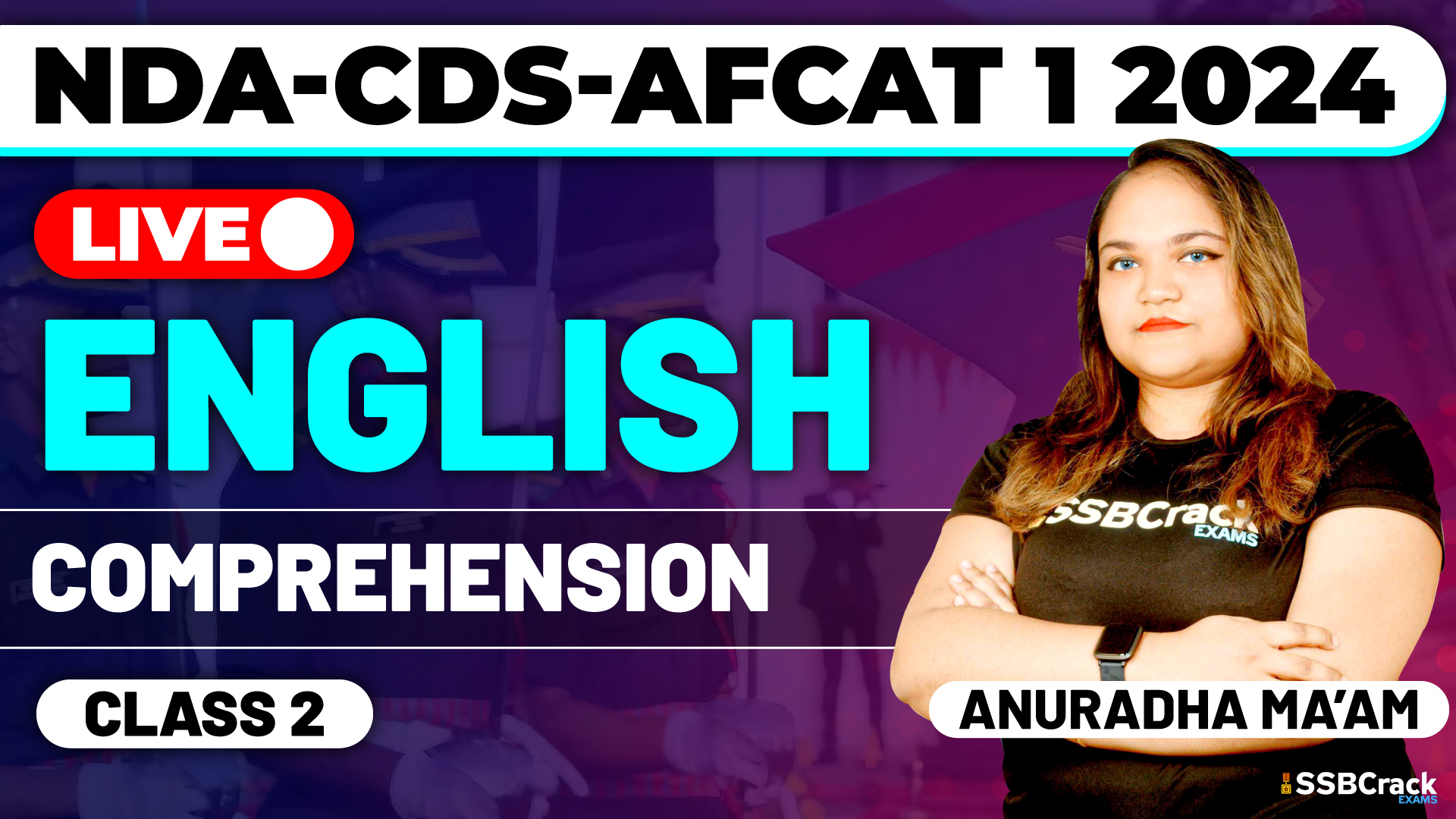In the challenging landscape of National Defence Academy (NDA), Combined Defence Services (CDS), and Air Force Common Admission Test (AFCAT) examinations, linguistic prowess takes center stage. Among the multifaceted challenges in the English section, the topic of “Comprehension” emerges as a linchpin evaluation. This article explores the pivotal significance of excelling in Comprehension, drawing insights from Comprehension Live Class 2. It aims to shed light on the importance of Comprehension in defense competitive exams, strategies for preparation, and the development of reading and comprehensive skills.
Directions: Read the passages carefully and answer the questions given below them.
There are three main groups of oils – animal, vegetable and mineral. Great quantities of animal oil come from whales, creatures of the sea which are the largest of the animals remaining in the world. To protect the whales from the cold of the Arctic seas, nature has provided them with a thick covering of fat, called blubber. When the whale is killed, the blubber is stripped off and boiled down. It produces a great quantity of oil which can be made into food for human consumption. A few other creatures yield oil, but none so much as the whale. The livers of the cod and halibut, two kinds of fish, yield nourishing oil. Both cod liver oil and halibut oil are given to sick children and other invalids who need certain vitamins.
Vegetable oil has been known from very old times. No household can get on without it, for it is used in cooking. Perfumes may be made from the oils of certain flowers. Soaps are made from eatable and animal products and the oils of certain flowers.
Q1) The main source of animal oil, is –
(a) fish
(b) whale
(c) seaweeds
(d) plants
Ans. (b)
Q2) Vegetable oil is mainly used for –
(a) eating
(b) cooking
(c) frying
(d) lubricating
Ans. (b)
Q3) The…….of fish yields nourishing oil.
(a) liver
(b) stomach
(c) eyes
(d) head
Ans. (a)
Q4) The thick protective covering of fat on a whale is called a –
(a) skin
(b) cell
(c) blubber
(d) fins
Ans. (c)
Q5) ……………. are made from vegetables, animal products and the oils of certain flowers.
(a) Perfumes
(b) Cosmetics
(c) Cooking medium
(d) Soaps
Ans. (d)
For more questions, check out NDA-CDS-AFCAT 1 2024 Exam English Live – Comprehension – Class 2
The Crucial Role of Comprehension in Defense Examinations
Comprehension, in the context of defense competitive exams, assesses a candidate’s ability to understand and interpret written passages efficiently. It evaluates more than just the capacity to read; it delves into the candidate’s depth of understanding, analytical skills, and the ability to derive meaningful insights from diverse texts. The strategic importance of Comprehension in NDA, CDS, and AFCAT exams is multifaceted.
Why Comprehension Matters:
- Critical Thinking Skills: Military officers encounter a plethora of documents, reports, and briefings. Comprehension skills are crucial for critically analyzing and extracting essential information swiftly.
- Decision-Making Acumen: In the dynamic realm of defense, rapid decision-making is paramount. Comprehension tests the ability to absorb information promptly, fostering the acumen needed for defense roles.
- Strategic Analysis: Military scenarios often demand strategic analysis of information. Comprehension hones this skill by requiring candidates to extract and comprehend key details from diverse passages.
- Effective Communication: The ability to convey information clearly is indispensable for military officers. Comprehension proficiency aligns with effective communication, as it requires candidates to articulate ideas derived from passages.
- Holistic Understanding: Comprehension goes beyond surface-level understanding; it demands a holistic grasp of the broader context, a skill indispensable for military officers faced with complex situations.
Strategies for Excelling in Comprehension:
- Active Engagement: Read passages actively, highlighting key points and noting the tone and context. Engage with the material rather than merely scanning it.
- Skimming and Scanning: Develop the ability to skim passages for a quick overview and scan for specific information efficiently. This enhances both speed and accuracy.
- Vocabulary Enrichment: A robust vocabulary aids in understanding nuanced passages. Regularly practice and expand your vocabulary to handle a variety of topics.
- Time Management: Allocate specific time for reading and answering questions. Practice timed comprehension exercises to enhance both speed and precision.
- Diverse Reading Practices: Read across various topics and genres to familiarize yourself with different writing styles and subject matters. This broadens your comprehension abilities.
Developing Reading and Comprehensive Skills:
- Regular Practice: Consistent practice is the key to honing reading and comprehensive skills. Solve a variety of comprehension passages to expose yourself to different question types.
- Review Mistakes: Learn from your mistakes. Analyze incorrect responses to understand the reasoning behind the correct answers and improve your approach.
- Reading Widely: Cultivate a habit of reading newspapers, articles, and books across diverse subjects. This helps in familiarizing yourself with varied writing styles and subject matters.
- Take Notes: While reading passages, jot down key points, the main idea, and any crucial details. This practice enhances memory and aids in answering questions accurately.
Conclusion: Nurturing Comprehension for Success
In conclusion, mastering the art of Comprehension is not just about acing an examination; it is a testament to the holistic development of linguistic and cognitive abilities crucial for defense roles. Approach Comprehension not merely as a hurdle in exams but as a vital stride toward becoming an analytical, discerning, and articulate leader in the armed forces. By diligently practicing and refining comprehension skills, aspirants fortify themselves for the linguistic demands that await them in the dynamic world of defense examinations.







